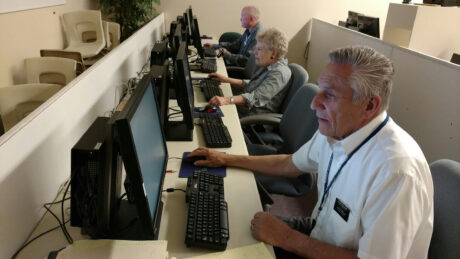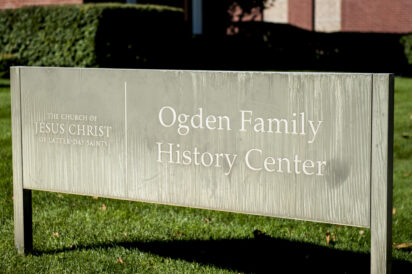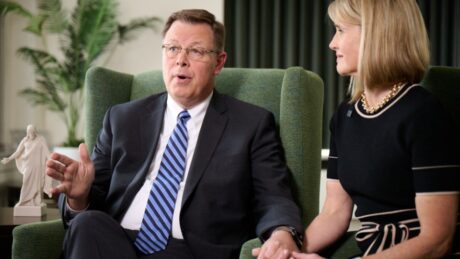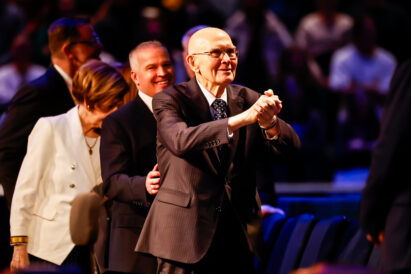Family history: A labor of love
-

LDS Church
Large touch screens give visitors to the Family Discovery Center a fun, interactive way to learn about their family history.
Large touch screens give visitors to the Family Discovery Center a fun, interactive way to learn about their family history.
-
Ogden FamilySearch Library patrons from left to right, Reed Scothern, Marlene Howertz and Ray Rutledge work on computers to research their family history.
- Russell M. Nelson, president of The Church of Jesus Christ of Latter-day Saints, speaks at the conclusion of general conference during the afternoon session at the Conference Center in Salt Lake City on Sunday, April 6, 2025.
-
The Family History Center is expecting an increase in visitors and ancestral work due to the newly reopened Ogden Temple. Photo taken in Ogden on September 22, 2014.
- Elder Gary E. Stevenson of the Quorum of the Twelve Apostles speaks during the Saturday evening session of general conference at the Conference Center in Salt Lake City on April 5, 2025.
Members of The Church of Jesus Christ of Latter-day Saints frequently refer to what they describe as the three-fold mission of the church. Spencer W. Kimball, the president of the church at the time, stated in the April 1981, general conference that the mission is “To proclaim the gospel, to perfect the Saints, and to redeem the dead.”
While many faiths emphasize the first two tenets, the Church of Jesus Christ is somewhat unique in how it approaches the third element, that of redeeming the dead.
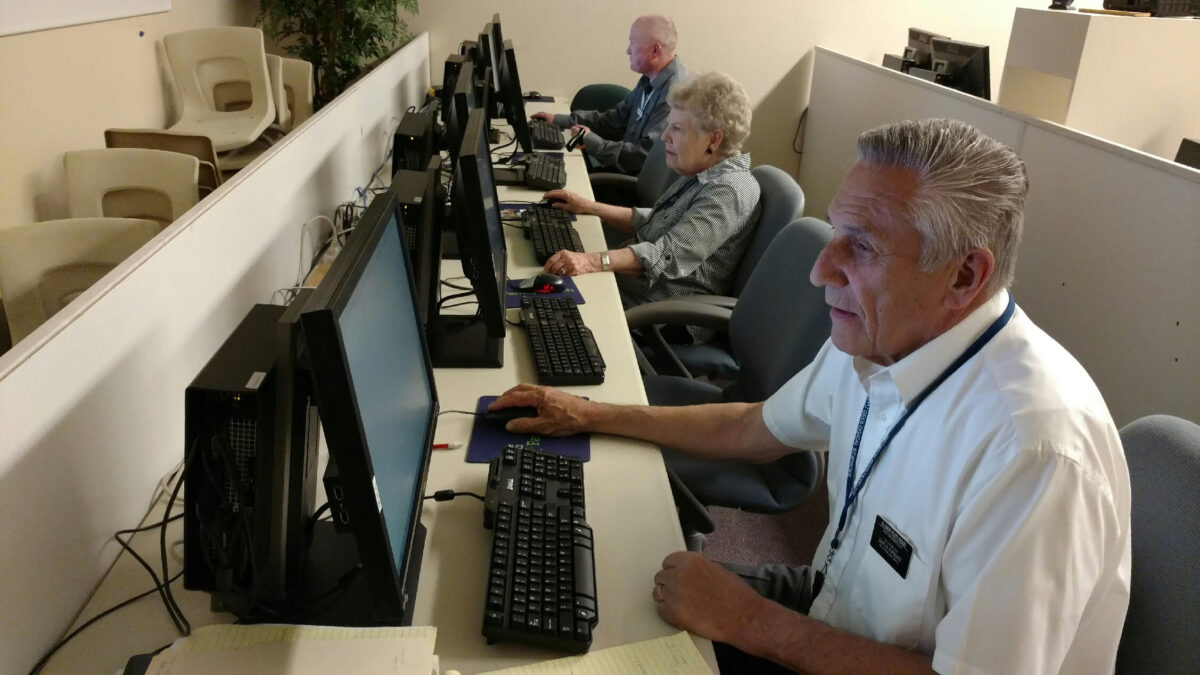
JANAE FRANCIS/Standard-Examiner
Ogden FamilySearch Library patrons from left to right, Reed Scothern, Marlene Howertz and Ray Rutledge work on computers to research their family history.
That objective is the driving force behind the organization’s emphasis on family history work, as well as the building of and ordinance work that is done in their sacred temples.
Historical perspective
Members refer to the scripture from 1 Corinthians in the Bible’s New Testament that reads “Else what shall they do which are baptized for the dead, if the dead rise not at all? why are they then baptized for the dead? (1 Cor. 15:29)” as an indication that the concept of doing religious ordinances for those who have died was known in the early days of the Christian church.
The Church of Jesus Christ emphasizes its belief that every individual who has lived on the earth has the right to learn about gospel teachings and choose whether to accept the precepts and responsibilities that come with it.
Thus members believe it is necessary for those alive currently to aid those who have lived previously. The church’s manual “Preach My Gospel: A Guide to Missionary Service” says:
“The Savior loves all people and desires their salvation. Yet millions of people have died without having any opportunity to hear the message of the restored gospel of Jesus Christ or receive saving ordinances. Through His loving grace and mercy the Lord makes salvation possible for everyone who did not have the opportunity to receive, understand, and obey the gospel during their mortal lives. The gospel is preached to these deceased people in the spirit world. Members of the Church on earth perform the saving ordinances in behalf of their deceased ancestors and others. Deceased persons living in the spirit world have the opportunity to accept or reject the gospel and the ordinances performed in their behalf.

Photo supplied, Intellectual Reserve
Russell M. Nelson, president of The Church of Jesus Christ of Latter-day Saints, speaks at the conclusion of general conference during the afternoon session at the Conference Center in Salt Lake City on Sunday, April 6, 2025.
“For this reason, Church members search for information about their ancestors. They can then add the information they find to the Church’s database at FamilySearch.org. A person can do so either on their own or with the help of a temple and family history consultant. The Church’s database then allows Church members to share or print out and take to the temple the names of deceased relatives who need to have saving ordinances performed on their behalf in sacred temples. This is an important aspect of doing family history. Worthy members of the appropriate age, including new members, are eligible to receive from their bishop a limited-use recommend to participate in performing baptisms and confirmations for these deceased ancestors.”
The Church of Jesus Christ believes this is the reason for the words written in the Bible’s Old Testament in Malachi which say: “Behold, I will send you Elijah the prophet before the coming of the great and dreadful day of the Lord: And he shall turn the heart of the fathers to the children, and the heart of the children to their fathers, lest I come and smite the earth with a curse. (Malachi 4:5-6)”
In the 1840s, the church’s founder and first prophet, Joseph Smith, recorded a letter regarding the importance of the work for the dead and researching past generations, saying: “Let us, therefore, as a church and a people, and as Latter-day Saints, offer unto the Lord an offering in righteousness; and let us present in his holy temple, when it is finished, a book containing the records of our dead, which shall be worthy of all acceptation. (Doctrine and Covenants 128:24)”
Building connections between the past and the present
While it is estimated that more than 117 billion people have lived on earth, the Church of Jesus Christ emphasizes that everyone is part of the tapestry of life, with a biological father and mother. Many also add siblings, spouses and children of their own to the family tree.
For members of the faith, the desire to provide opportunities for blessing for those who have died results in connection with ancestors.
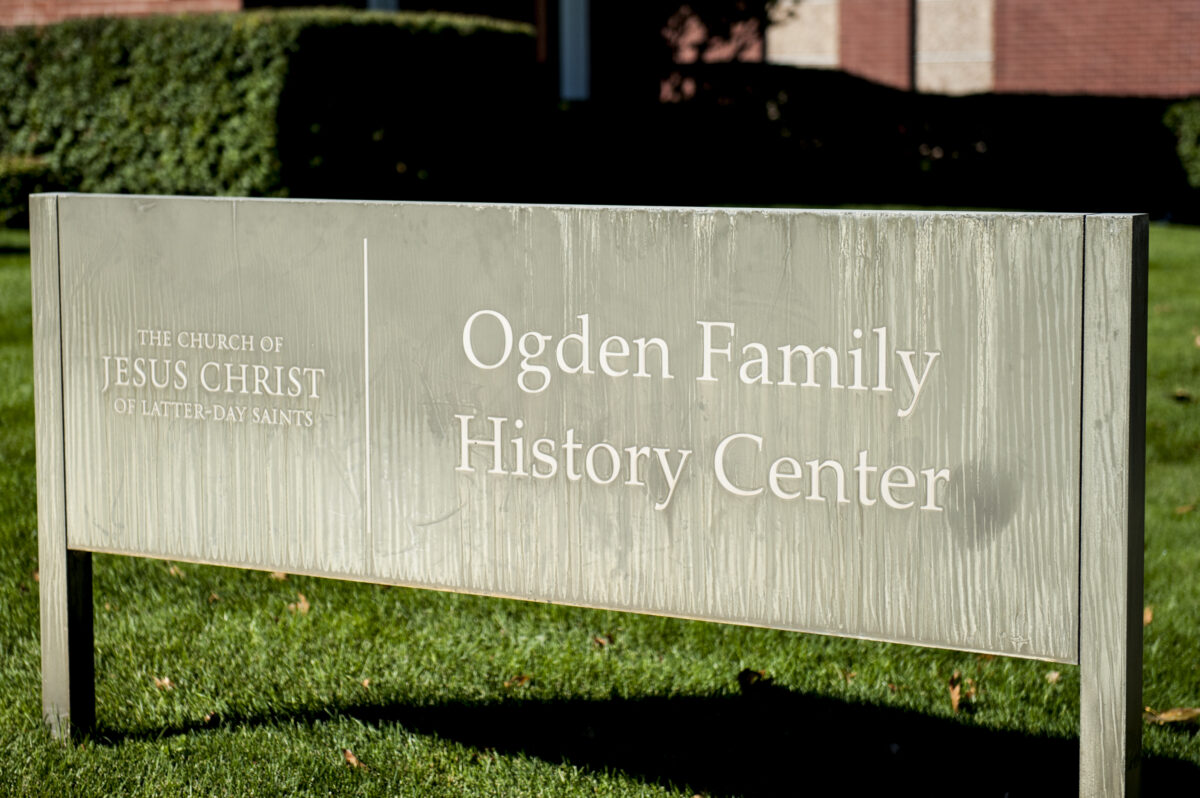
ROBBY LLOYD/Standard-Examiner
The Family History Center is expecting an increase in visitors and ancestral work due to the newly reopened Ogden Temple. Photo taken in Ogden on September 22, 2014.
In a talk given in April of 2023 entitled “The Work of the Temple and Family History–One and the Same Work, “Elder Benjamín De Hoyos 0f the Seventy talked about how the work of family history is tied to the work done in the church’s temples.
“The construction and proper use of temples has been in any dispensation a sign of the true Church of Jesus Christ,” De Hoyos said. “After the dedication of the Salt Lake Temple in 1893, President Wilford Woodruff encouraged the members of the Church to find the records of their ancestors and to record their genealogy by going as far back as possible in order to bring the names into the temple and perform the ordinances of salvation and exaltation.”
He went on to exhort members to understand the importance of the combined efforts.
“Dear brothers and sisters, the Lord encourages us as members of His Church to preserve our own family history, to learn from our ancestors, and to make the necessary arrangements for them to receive the ordinances of the gospel in the temples to help them to progress along the covenant path, which will bless them with an eternal family,” he said. “That is a central focus of the plan of our Heavenly Father: uniting family for this life and for eternity.”
A labor for everyone
In recent talks, Church of Jesus Christ leaders have encouraged everyone to get involved in the work and lauded the efforts being made, particularly by the youth.

Photo supplied, Intellectual Reserve
Elder Gary E. Stevenson of the Quorum of the Twelve Apostles speaks during the Saturday evening session of general conference at the Conference Center in Salt Lake City on April 5, 2025.
Elder Gary E. Stevenson of the Quorum of the Twelve Apostles said in his talk, “Days Never to Be Forgotten,” in October of 2024 that the work will “unite families for eternity.”
“As I visit temples around the world, I marvel at the standing-room-only crowds of youth waiting at the baptistry and the increased numbers of young adults serving as ordinance workers,” Stevenson said. “Recently a group of over 600 youth from Scotland and Ireland traveled to the Preston England Temple, performing over 4,000 ordinances, many of which were for their personal deceased ancestors! I urge you to become engaged in family history, spend time in the temple, and carefully prepare yourself to be the kind of man or woman ready to marry an equally worthy companion in the temple.”
President Russell M. Nelson, the current president of the Church of Jesus Christ, added his appreciation to the youth in his April 2025 talk, “Confidence in the Presence of God.”
“I am especially inspired by our youth,” Nelson said. “They are giving service in large numbers. They are seeking their ancestors and performing ordinances in the temple. Our young men and women are submitting applications for missionary service in record numbers. The rising generation is rising up as stalwart followers of Jesus Christ.”
Benefits promised for the work
Church members will receive blessings for their family history and subsequent temple work, according to their leaders.
Bishop Gérald Caussé, the presiding bishop, said in his talk “Compensating Blessings” in April of 2025 that such effort
“One of the most powerful ways we may contribute to God’s compensating blessings is through the vicarious work we do for our ancestors in the house of the Lord,” Caussé said. “As we perform ordinances on their behalf, we actively participate in the Lord’s great work of salvation, using our gifts and abilities to provide blessings to those who did not have the opportunity to receive them during their mortal lives.
“The loving service we offer in holy temples reminds us that the Savior’s grace extends beyond this life. In the life to come, we may be given new opportunities to accomplish what we could not do in this mortal life. Speaking to sisters who had not yet found an eternal companion, President Lorenzo Snow lovingly said: “There is no Latter-day Saint who dies after having lived a faithful life who will lose anything because of having failed to do certain things when opportunities were not furnished him or her. … They will have all the blessings, exaltation and glory that any man or woman will have who had this opportunity.”
Elder Steven D. Shumway of the Seventy highlighted that the church doesn’t believe that such works bring salvation on their own, only that they help individuals grow and improve.
“Ordinances don’t save us because they fulfill a heavenly checklist,” Shumway said in his talk, “Participate to Prepare for Christ’s Return” in April of 2025. “Rather, when we live the covenants connected with these ordinances, we become the kind of person who wants to be in God’s presence. This understanding overcomes hesitations to serve or preferences not to serve. Our preparation to meet Jesus Christ accelerates when we stop asking what God will permit and start asking what God would prefer.”
The bottom line, according to Elder Quentin L. Cook of the Quorum of the Twelve Apostles, is that while doing family history brings individual growth, only the atonement of Jesus Christ will bring salvation.
“We must never forget the sacrifices and examples of prior generations, but our adulation, appreciation, and worship should be centered on the Savior of the world and His atoning sacrifice,” Cook said in his talk “The Atonement of Jesus Christ Provides the Ultimate Rescue” in April of 2025. “I testify that the key to the Father’s plan of happiness is the Atonement wrought by our Savior, Jesus Christ. He lives and guides His Church. The Atonement of Jesus Christ provides the ultimate rescue from the trials we face in this life.”
Starting at $4.32/week.
Subscribe Today


